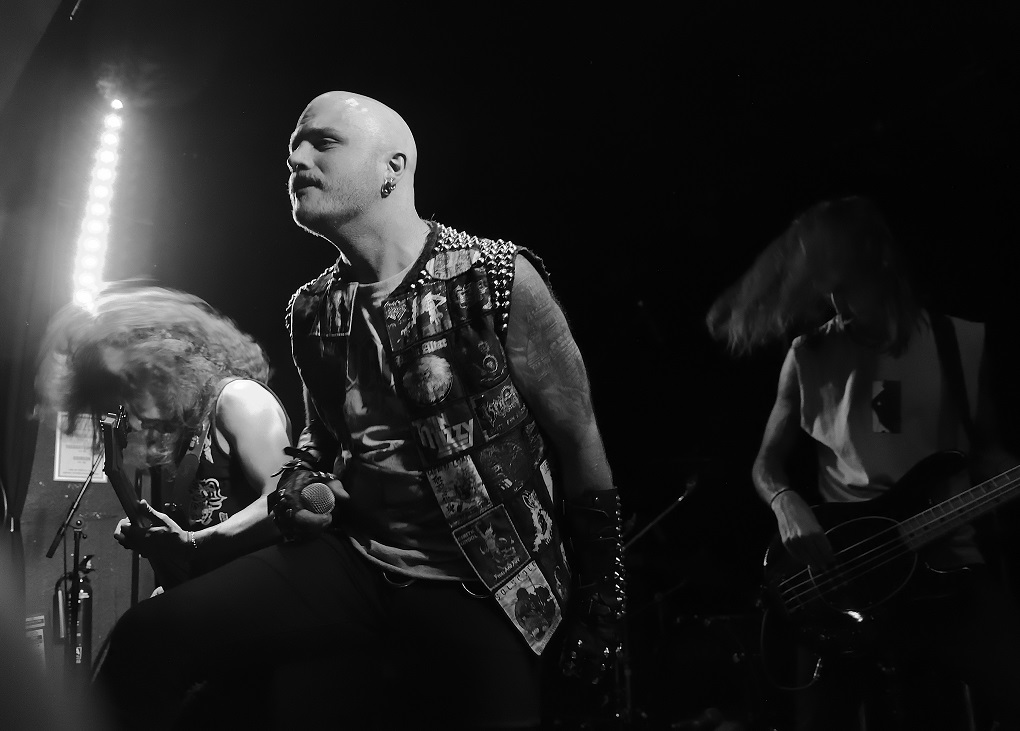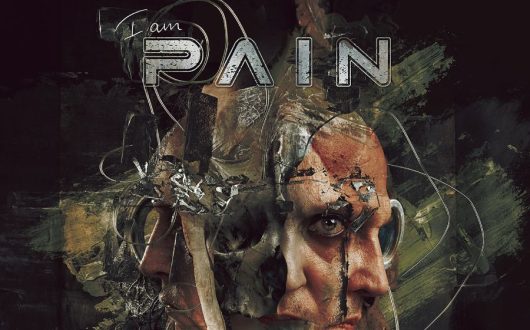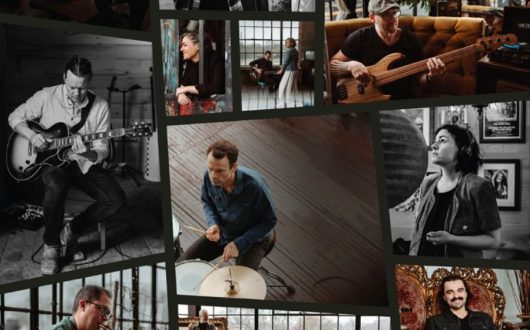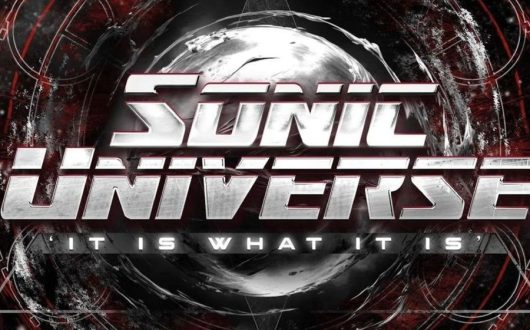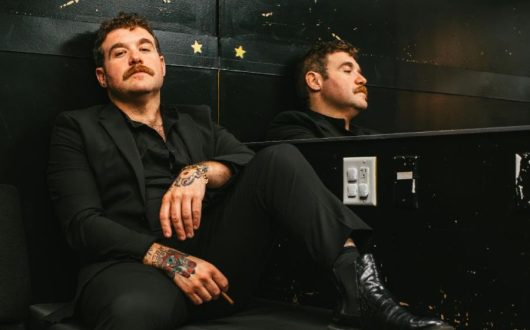Interview by Adrian Hextall
Visigoth – a member of the branch of the Goths who invaded the Roman Empire between the 3rd and 5th centuries AD and ruled much of Spain until overthrown by the Moors in AD711.
OR
Visigoth – The hammers of heavy metal ring loud and true in the mountain halls of Salt Lake City, Utah! Standing in staunch opposition to any presumptuous notion of ‘reinventing the wheel’ or ‘redefining the genre’, Visigoth instead dedicate themselves to worshipping at the ageless altars of heavy metal with a singular focus on writing music inspired by their favourite records. Whether whipped into a frenzy ignited by classic USPM or NWOBHM anthems, or pensively meditating on traditional epic heavy metal or weighty doom-inspired moments, these Salt City hessians wear their influences proudly on their sleeves.
We spoke to the latter ahead of their recent European tour. I had a cold one with the boys and, with Jake and Leeland doing most of the talking, we caught up on the history of the band and the impressive ‘Conqueror’s Oath’ album.
Band Members
Jake Rogers (Vocals), Leeland Campana (Lead Guitar), Jamison Palmer (Guitar), Matt Brotherton (Bass Guitar), Mikey T. (Drums)
AH: Was it difficult to keep the album to 40 minutes? I imagine you had plenty of material that could fill in an hour quite comfortably just like the debut?
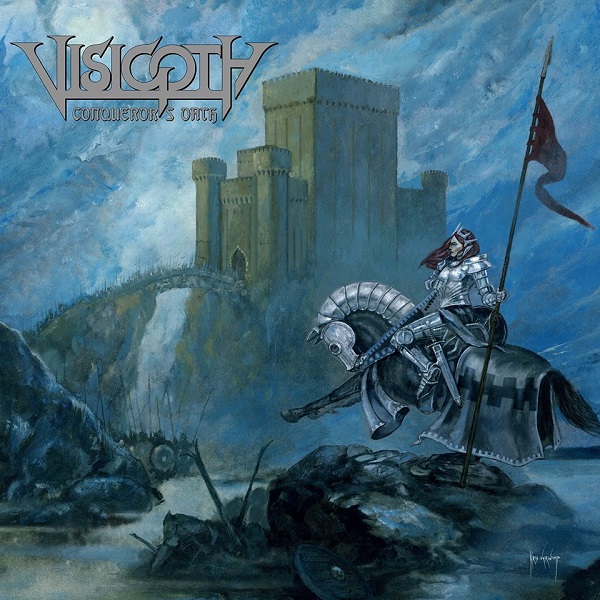
Leeland: It’s hard because in the epic genre, we’re like, “Oh, what if we put it this feeling in here or this build up?” The song tend to… like on the first album, they dry out at about six-seven minutes each song.
Mikey: And we feel like some of the songs on the first album got pretty boring ’cause they just kind of meandered, especially the middle of that album. I think it’s kind of like drags a bit. So we wanted to… this was our…
AH: So if you guys who actually kind of accept that, that first album it must have been quite a learning experience because you only had, what, a couple of tracks in an EP before that?
Visigoth: Yeah.
Leeland: Yeah. And it’s difficult because you have to trust… like you have to get better at songwriting because like your temptation is to make the song a little longer because you want to better. It kind of forces to be better songwriters per song to make the album.
We had to make this a little bit of sacrifice here and there. I feel like, “Oh, this part was cool.” But we can do it. It’s like yes.
AH: But presumably in the live show if the moment takes you, something like that that you’ve actually almost rehearsed, it could go in the song at that point. You could bring back if…
Visigoth: It could but we don’t want to crash and burn alive.
AH: You don’t want to pull a Malmsteen where everybody just stands back and let you go off on one…
Visigoth: Yeah.
Visigoth: Right, right.
Matt : Yeah, yeah, yeah.
Visigoth: It’s like, “Hey, listen to this part we’ve practiced twice.”
Leeland: So, yeah. It’s always difficult. Like it gets… I feel like the songwriting part never gets any easier, but we’ve been able to kind of build our skills a little bit more… especially in the second album.
AH: So opening track really sets the scene for what you’ve come full this time. It’s… I’ll use the word epic. I mean it certainly is. It really is a rousing anthem, isn’t it? It’s going to appeal, I would say, to a lot of sort of the classic power metal bands from the US. But also, the European feel on there as well. The band has got Germanic roots to it, hasn’t it, with the name?
I was reading up on the name this afternoon. It’s like, “Jesus, how much history is that here where you guys could’ve got all this from?” And I’ve gone all the way back to 300 A.D. and things like that. It’s like, “Alright.” But interestingly, the name itself, you would’ve thought would’ve been more suited towards a Gothic metal band because that’s where the term the Gothics came from.
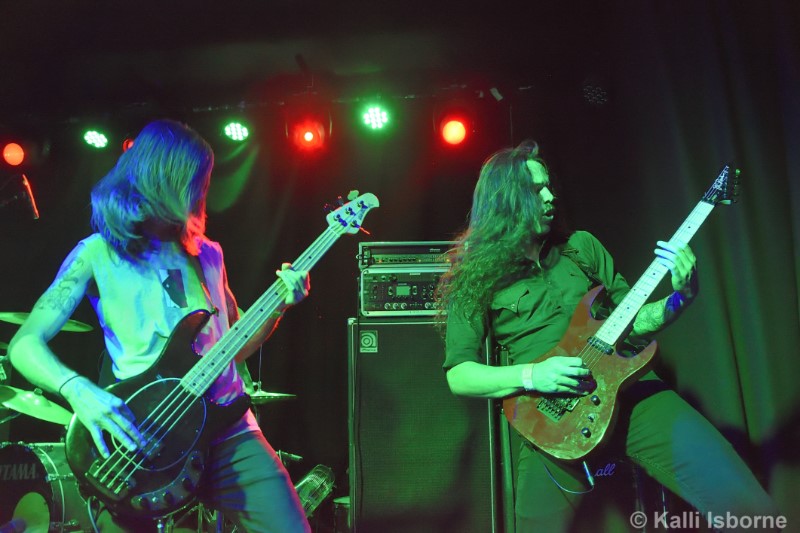
Visigoth: Yeah.
AH: But of course, you’re not. So why did you settle on it?
Visigoth: Ostrogoth.
Leeland: Yeah. Well, the Visigoths being a Germanic order tribe and being the first people to conquer Rome, and it just… it invokes the heavy metal warrior spirit very concisely.
And we were really that set on having a single word band name. Just one word and like memorable and Visigoth was kind of the first one on our list that we wrote down that haven’t been used yet by a professional band, which was kind of shocking. Ostrogoth had already been used, which is another tribe of Goths.
Mikey: And they’re solidly traditional. And we’re big Ostrogoth fans too. So, I mean…
Visigoth: I always like how Visigoth kind of translates to western Goth.
AH: Yeah.
Leeland: It’s like Western Europe. But they were from the Western United States. And so, there’s kind of like… there’s a loose tie. And we felt like… because when you’re naming your band, it’s so painful and difficult.
Jake: It’s hard to name a band.
Leeland: Because like you build your bands to kind of credibility or ethos around the name later. And so, we’re like, “Well, Visigoth…” I mean like we didn’t want to get… it’s like we need a single word and that’s difficult… because most bands are already taken. But we like that one and we’re like, “Yeah, I think this fits.” It’s kind of like it leaves us open to… create a meaning to that name eventually.
AH: Yeah. I was going to say you can come up with something. If you pick three words for the name of the band, you can find yourself abbreviated, you can find yourself turn into an acronym, or things like that.
Visigoth: It doesn’t fit on a shirt.
AH: Exactly.

Jake: I think English music is probably my biggest single influence as a musician.
AH: Yeah?
Matt : Like rock and roll, just everything from Sabbath to Rainbow and Deep Purple and all that.
AH: So the real… the late 60s, early 70s?
Visigoth: Yeah.
AH: So, there’s a huge gap there to be filled because there’s not many bands like yours that are out there playing that type of music.
To be fair, bands like Manowar are on the verge of almost becoming a parody of themselves. It is quite comical at times now when you see them… it’s almost too much leather and fur and oil at times.
Matt: Probably getting worse…
AH: This stuff you’re singing about though actually feels authentic. You can picture the cinematic brave heart scene, or something like that, which is I guess what you’re obviously going for.
Visigoth: Yeah.
AH: But it feels right not just done for fun.
Leeland: No, I really appreciate that actually. I have something to say about this. I think what you described there like… when I’m writing like a musical passage or something like that, either guitar or if I’m imagining… writing something and thinking what Jake will eventually be able to come up later with and altogether as a band what we… the feeling like we love that where you kind of get that cinematic scope in your head, like the brave heart feeling, like that.
Jake: A lot of times that we watch that movie and it’s been like…
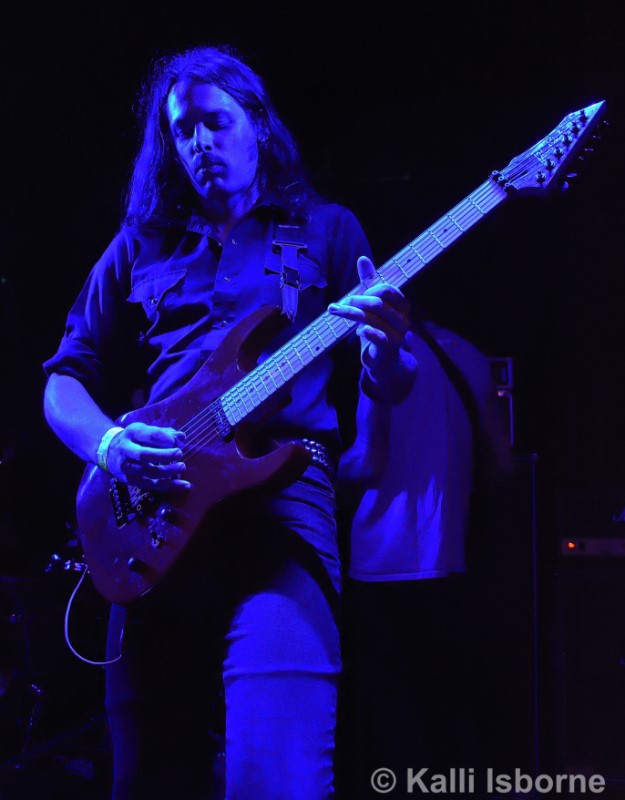
Visigoth: We literally have a song about Highlander.
Leeland: Right. Well, yeah, the song about the movie. Like movies are great kind of like allegory, trying to find… capture that feeling that maybe that’s what seems authentic about it rather than like hook you. It’s like that cinematic feel you get like listening to something, that’s what I like to hear the most and…
…we try to kind of invoke. But it’s why that… the question is why isn’t that a parody of itself, like it’s kind of harder to answer. But like…
Mikey: It’s because of a sincere love for the influences that we’re pulling from and then translating them in a way that we’re really excited about and passionate about because we sincerely do love the music that we listen to and…
AH: You haven’t really got that overly theatrical approach that say Manowar have always… It’s almost too much.
Visigoth: Like shackle to a gimmick.
AH: Exactly.
Matt:: Like once we put on the mask, we can’t take them off. Like, I got sweat under this thing for 30 years.
Mikey: Just treating the audience with a good lively set.
Leeland: I feel like… like the feeling should be more femoral, more like relatable subconsciously to have that epic feeling because you don’t have to oil up every show.
AH: When you do play live, does it look like you on stage? Or have you suddenly got this whole other persona when you’re out there, when you’re all in matching outfits and…
Mikey: There’s more of a… we don’t necessarily matching outfits, but there’s more of a… we’re connected as a persona.
Jake: I think we’re a little more focused, like as individual people just kind of wandering around. We’re pretty scattered brain, I feel like.
Visigoth: Yeah. [Laughter]. So when we’re playing a live show, we’re definitely focused.
Visigoth: Yeah.
Visigoth: It’s more in sync as like a… because we practice for so long. We held the same line up for more than 10 years.
Visigoth: Oh, yeah, yeah. We’re almost ten years.
Visigoth: Almost, that’s right.
Visigoth: Yeah.
Visigoth: -almost ten years.
AH: When is the anniversary?
Visigoth: 2020.
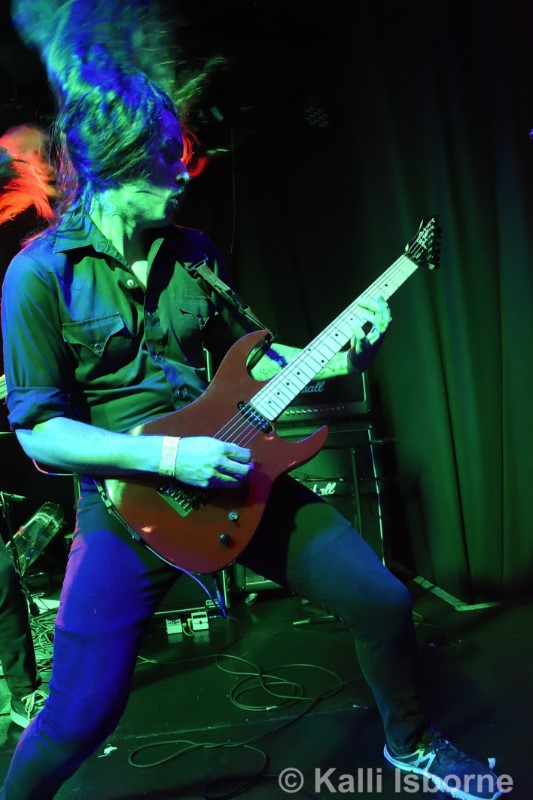
Jake: Yeah. It’s kind of like this… like sort of… people see us on stage and like… and they’ll talk to us after the show and be, “Oh, you guys are fucking dorks.”
Visigoth: So it’s like… what we do… it feel like… [group chat commences]
Visigoth: They’re expecting us…
Visigoth: –falling to like a stage persona that is there to like…
Visigoth: Facilitate the music.
Matt: Facilitate the music, the feeling like, projected out live.
Visigoth: Yeah, I start going crazy about it…
Visigoth: Right. And like offstage, their demeanor. I would fall to a character almost. But it’s been practiced and honed over all the live shows.
AH: What’s your typical audience like? I mean you hear a lot of a sort of… so once you use a description, the battle metal bands, the audience is they bring armour, swords, shields. So are you getting that in the crowds? Or are you getting what you would call just genuine metal bands?
Leeland: No, we have much more… yeah, we have much more of a heavy metal crowd than like the folk metal thing might bring. I don’t know. We’re getting more of the… I don’t know.
Visigoth: Yeah. There’s some crossover like people who are in the folk metal, big metal and they’ll find something, of course.
Jake: So, that’s cool. Well, it seems like it’s mostly denim and leather and beers and spikes and chains…
AH: That’s fair enough. The reviews of the album. Now, I did mine about four or five months ago and you must, therefore, have had reviews aplenty since then.
Visigoth: Mm-hmm.
AH: Have there been massively differing opinions because of the style of music and the lyrical content, or has it been fairly consistent?
Matt: It’s been pretty consistent.
Visigoth: It’s been pretty good.
Jake: It’s mostly being consistent. There’s like a one song in the album that’s really divisive.
Visigoth: Oh yeah.
Jake: Some reviews really hates Salt City and some really like it because it’s a rock and roll song. It’s not a heavy metal song. So people who don’t like that or just…
AH: People feel uncomfortable when it steps outside of what they know.
Visigoth: Right.
Visigoth: I think those people just need to listen to more Jailbreak, and that’s my opinion.
Visigoth: Or maybe to some people it’s just a crappy song, which is also totally fine. That’s where the…
Matt: Overall, the reception has been really positive, which has been very good.
Visigoth: Yeah.
Leeland: But with that song, I almost… I’m glad that everyone can label that song as a criticism because you don’t have to dig so hard. They criticize something else off the album and they’re actually enjoying themselves more. So we might have to throw the critics a little bit of a bone there and be like, “Oh, it’s good.” But there’s one song be like, “Yeah.”
Visigoth: That’s the only song that’s been kind of like… some people like it, some people don’t.
Matt: That’s right. Some people hate it, actually, which is impressive. But that’s fine. Whatever. I don’t.
AH: There’s still seven more songs on there.
Matt: It’s not… well, the thing about the size it is not for them, it’s for our friends back home.
Leeland: Well, it’s Salt Lake. Like some people really like Salt Lake and some people really don’t like it. And it’s just like that song.
Visigoth: Now, let’s say that song is for… that’s for our friends back home that stuck with us through the years and always support us. It’s not for…
AH: It is also about grabbing as you say though, you’re hanging on to your die hard fans and you don’t want to give them something by occasion. It’s a track this time where they’re, “Hey, why not?”
Visigoth: Our friends back home wrote that one. We did play a lot shows in Salt Lake City before we broke out. They deserve it for showing up almost every weekend and they come see us play.
Mikey: We have played five people on a Tuesday in the dive bar. That was most of our…
Visigoth: Yeah. That’s fairly cool.
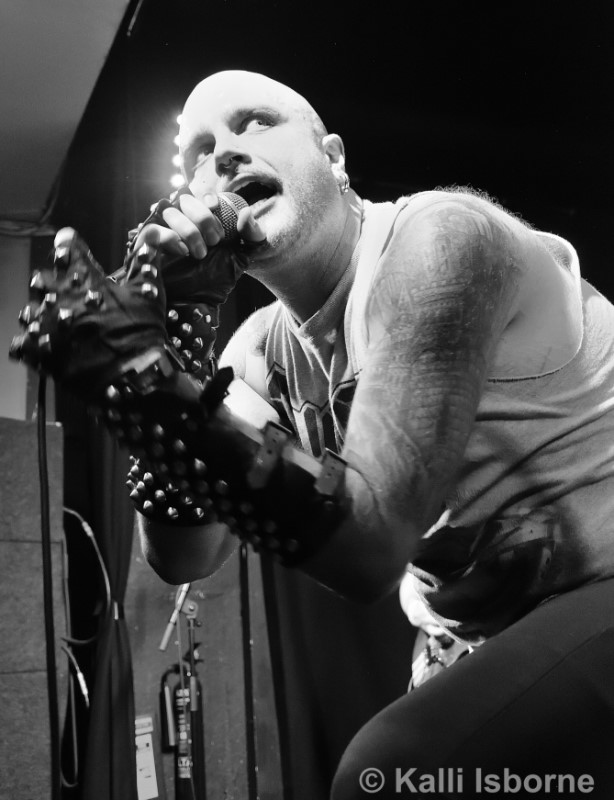
AH: And it’s a great voice that compliments the rest of the band sound completely. But it’s not like you’re ripping off Dio or something like that because it would’ve been so easy to do that style of…
Jake: I think that’ll be hard. You picking of Dio sounds like I’ve got difficult tasks. No, yeah. I mean I don’t know. All I think about is the influences that I have. I don’t think of my voice as… I don’t think of it that way. It’s cool to hear that.
Leeland: Yeah, that’s a good way of putting it. Nobody is free of influences. Nobody is original. Don’t…
AH: Yeah. Anybody who says they are is lying.
Jake: Yeah. Nobody is original, and that’s fine. It’s good to absorb your influences and then create something out of it.
The last thing about that I have to add was more like it’s been a discovery of like what limitations do we feel like we have and where do our strengths lie? How to creatively get to what’s stronger? It’s like the sound of the voice, and like the overall sound of the man. You heard a lot of bands were like they’re always good when they’re high like [sings………..] like…
Well, we learn that… or I learned that the hard way with our first EP, because I did some of those, and I can do them. Like if I were to party and you’re like, “Hey, you’re doing the scream thing,” I can do the scream thing. But the reason that our music doesn’t have it anymore is just ’cause I found that the way that I’m built… I’m not a high singer. I’m like a tenor-ish range. See, this is how little experience. I don’t really…
AH: You’re a low tenor?
Jake: Yeah. That’s about my extent of knowledge. But I’m a tenor. And so, like doing that, I can. But it’ll wear my voice out so fast. But if you were to see us 20 days into a tour and were having to do those big screams every night. And this is my limitations. There are singers who are better than me that they can do that every single night. And that’s awesome. Like I wish I could. That’s not the kind of singer I am, and that’s okay.
AH: Your voice suits battleground vocals.
Jake: See, and that’s fine and I’m happy with that. I’m not saying this in a self-deprecating like, “Oh, I’m terrible.” I have limitations, and that’s okay.
It’s the type of singer I am. Like I said, I’d rather have something memorable and like rousing that people want to sing along with, I guess.
AH: What is nice here as well though is at this point in your career, you’re still happy to admit that. When you’re playing stadiums, it’s like, “I don’t have limitations, dude. Get out of here.”
Visigoth: I’m the first to admit it, probably to a fault. We’ll do interviews and these guys have got… well, we back up, back up. Jake, we’re not that… you’re not that terrible. I don’t know.
AH: You can’t write an album that everybody responds favorably to. Someone always finds something.
Jake: Admitting limitations is a really good way to know how to write a good song because then you know where the strengths are and where your opportunity areas are.
It helps describe eventually what kind of band you’re about to become because as a solo project, like all… first of all, as a band, like the potential of the band changes as the members kind of discovered their own talents and stuff like that.
Leeland: Well, I think that’s why there’s like… I think that’s why the vocal performance on this new record sounds, at least to my ears, sounds more confident. I feel like I sounded more confident when I go and listen to it. It’s because I was because we wrote songs… we would even pick like… we’re going to write a song in this key because Jake’s voice sounds good in this key.
AH: That’s the big win, isn’t it? You’ve got to enjoy performing them. If you’re pushing yourself in a direction, even if you hate this, you’ll do it. But you’ll never be able to translate that to an enjoyable live performance.
Leeland: The other thing we didn’t say is what that requires is if you write a song and the key that’s not the right key. Sometimes you’ve got to throw it out.
Visigoth: Yeah, we have…
AH: And you’re happy to throw things out as well.
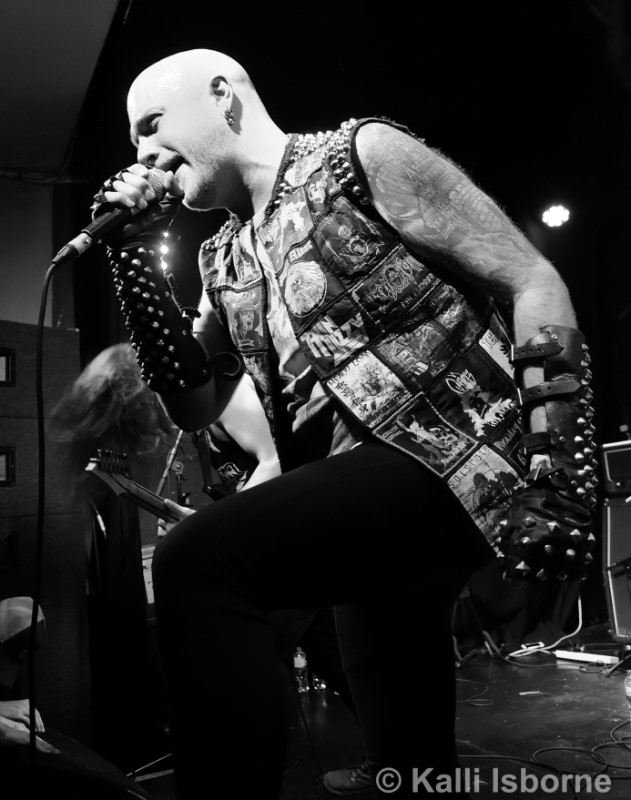
Jake: We’ve had so many songs that we’ve thrown out, yeah, because they weren’t coming together. And that can be hard for some bands if… they’re like, “No, you have…”
Leeland: Some bands would like dig their heels and like, “No, we’re going to make this work.” But like you have to know when something isn’t working out.
Mikey: We kind of have a role if we feel like we’re fighting a song at all. We’re actually pretty quick to scrap it at this point.
Matt: Yeah.
Visigoth: We don’t fight with songs.
Matt: We’ve kind of learn that the best songs, the songs that fans end up liking the most are also usually the ones that come together really fast that we just kind of like get together to jam and a song falls out and we fine tune it. But the basic structure is there…
Visigoth: That’s kind of how [opening track] Steel and Silver went, right?
Visigoth: Steel and Silver was like a practice.
Visigoth: That’s a lot of practice.
Visigoth: Yeah, that one feels like… we didn’t even think about that stuff.
AH: And then you have the lead track into the album.
Jake: No. In fact, I remember, I had come to practice with the chorus and then Lee just was like, “Hey, how about this for the verse riff and then Jamison came up with the bridge.
Jamison: Was that the pre-chorus?
Leeland: You came over with the pre-chorus and the bridge that we’re like black metal riff. I don’t know. It doesn’t matter really who did what. But like it was sort of one of those where like we had an idea and then just like Lego brick only idea and then there’s abruptly a song. I think it took us an hour to write.
Jamison: Yeah, something like that. Yeah.
Mikey: Yeah, it was more like there’s like this sensation where like one… a couple of pieces fall in a place. You immediately know where like the next moves are and like the chess match against you and trying to write a good song. And so, like… it’s kind of a way I see it sometimes. Like you’re like, “Hey, since this happened, then we know that this and these things have to happen.” And sometimes when it comes together quickly, that ends up being the best songs.
AH: And the thing that shows as well, you’re all talking about it and there’s a smile on everybody’s face, which has good experience, good song. Yeah. Nice.
Mikey: It’s best for the song that I pick when people are like, “Oh, how does your band sound like?” I’m usually like “Oh check out this song”. I feel like it’s a good distillation of…
Jake: Various aspects of the sound.
AH: Fair enough. Last question because I have you guys out here for a while. You’ve got the tour now. You’ve gone through Europe. What can we expect?
Visigoth: Like Grand Funk Railroad said we’re an American band. We’re coming to your town. We come to party it down. We’re an American band.
Visigoth: And I’ll say to expect, we have the utmost enthusiasm and like gratitude.
Matt: We’re always enthusiastic.
Jamison: Yeah, we’re always enthusiastic. But like we’re very appreciative and we’re very happy to be here.
Visigoth: It’s so good to be here.
Matt: Yeah. It’s all good.
Visigoth: Bring 110%, dude!
Jamison: Positive energy.
Our review of the London show can be found here:
https://myglobalmind.com/2018/07/18/visigoth-live-boston-music-room-tuffnell-park-london/
Our review of Conqueror’s Oath
https://myglobalmind.com/2018/03/24/visigoth-conquerors-oath-review/
SOCIAL LINKS:
https://www.facebook.com/visigothofficial/
https://www.instagram.com/visigothslc/
